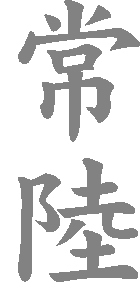|

DAIMYO of
HITACHI PROVINCE
Tokugawa (Mito)


- Domain: Mito
- Stipend: 350,000 koku
- Class: Sanke 3
- Headquarters: Mito Castle (Hilltop)
Branch issued from Yorifusa, 9th son of Ieyasu. It was one of the Sanke, to
which the last Shogun, Keiki, belonged by right of birth.
Senior branch.
Succession
- Yorifusa (1603-1661) - Daimyo of Shimotsuma (Hitachi -- 100,000 koku); 1st
Tokugawa daimyo of Mito (1609-1661)
- Mitsukuni (1628-1700, daimyo 1671-1690)
- Tsunaeda
- Munetaka (1705-1730, daimyo 1718-1730)
- Munemoto (1728-1766, daimyo 1728-1766)
- Harumori
- Harutoshi (1773-1816, daimyo 1805-1816)
- Narinobu
- Nariaki (1800-1860, daimyo 1829-1844)
- Yoshiatsu
- Akitake (1853-1910)
Notable Ancestors
-
Tokugawa
Yorifusa (1603-1661)
9th son of Ieyasu. In 1606 received the fief of Shimotsuma (Hitachi --
100,000 koku); in 1609 he was transferred to Mito, where his descendants
remained.
-
Tokugawa
Mitsukuni (1628-1700)
%20715x599.jpg)
3rd son of Yorifusa, who, because of his intelligence, was chosen to
succeed his father. He cultivated letters and history.
-
Tokugawa
Nariaki (1800-1860)
%20450x600.jpg)
.jpg)
Descendant of Mitsukuni and likewise, daimyo of Mito.
-
Tokugawa Akitake (1853-1910)
.jpg)
18th son of Tokugawa Nariaki, younger brother of Shogun
Tokugawa Yoshinobu.
Related Branches
- Matsudaira (Mito): Takamatsu (Sanuki -- 120,000 koku)
- Matsudaira (Mito): Moriyama (Mutsu -- 20,000 koku)
- Matsudaira (Mito): Fuchu (Hitachi -- 20,000 koku)
- Matsudaira (Mito): Shishido (Hitachi -- 10,000 koku)
Sources
Tsuchiya


- Domain: Tsuchiura
- Stipend: 95,000 koku
- Class: Fudai 5
- Headquarters: Tsuchiura Castle
%20401x599.jpg)
Daimyo family descended from Minamoto Yasuuji (Seiwa-Genji). In 1602 made noble in
the person Tadanao (1585-1612). It resided successively: at Kururi (Kuzusa);
in 1669 at Tsuchiura (Hitachi); in 1681 at Tanaka (Suruga); then from 1688
again at Tsuchiura.
Succession
- Kazunao - 1st Tsuchiya daimyo of Tsuchiura (Hitachi -- 45,000 koku), 1st
tenure
- Masanao (1641-1722) - 2nd Tsuchiya daimyo of Tsuchiura; daimyo of Tanaka
(Suruga -- 45,000 koku); 1st Tsuchiya daimyo of Tsuchiura, 2nd tenure
- Nobunao
- Atsunao
- Hisanao
- Yasunao
- Hidenao
- Hironao
- Yoshinao
- Tomonao
- Shigenao
Sources
Makino


- Domain: Kasama
- Stipend: 80,000 koku
- Class: Fudai 5
- Headquarters: Kasama Castle
Daimyo family that came from Mikawa and descended from Takechi-uchi no
Sukune.
Branch that resided successively: in 1683 at Sekiyado (Shimosa); in 1705 at
Yoshida (Mikawa); in 1712 at Nobeoka (Hyuga); and from 1747 at Kasama.
Succession
- Narisada (1526-1567)
- Yasunari (1555-1609)
- Narinori
- Narisada - 1st Makino daimyo of Sekiyado (Shimosa -- 53,000 koku)
- Nariharu - 2nd Makino daimyo of Sekiyado; 1st Makino daimyo of Yoshida
(Mikawa -- 80,000 koku)
- Narinaka - 2nd Makino daimyo of Yoshida; 1st Makino daimyo of Nobeoka (Hyuga
-- 80,000 koku)
- Sadamichi (1707-1749) - 2nd Makino daimyo of Nobeoka; 1st Makino daimyo of
Kasama
- Sadanaga (1733-1796)
- Sadaharu
- Sadamoto
- Sadakatsu
- Sadanori
- Sadahisa
- Sadanao
- Sadayasu
Related Branches
- Senior branch: Nagaoka (Echigo -- 74,000 koku)
- Junior branch: Komoro (Shinano -- 15,000 koku)
- Junior branch: Mineyama (Echigo -- 11,000 koku)
Sources
Yamaguchi


- Domain: Ushiku
- Stipend: 10,000 koku
- Class: Fudai 5
- Headquarters: Municipal office
Daimyo family decended from Mochimori, 2nd son of Ouchi Yoshihiro. From
1601 resided
at Ushiku.
Succession
- Shigemasa
- Hirotaka
- Shigetada
- Hirotoyo
- Hironaga
- Hiromichi
- Hirochika
- Hiromune
- Hirokuni
- Hirokata
- Hiroakira
- Hiroyoshi
Sources
Hosokawa


- Domain: Yatabe
- Stipend: 16,000 koku
- Class: Tozama 5
- Headquarters: Municipal office
Daimyo family descended from Minamoto Yoshisue (Seiwa-Genji), was very
powerful from the 14th to the 16th century. It was one of the three families (sankan)
from which the Kyoto Kanryo had to be chosen.
Branch founded by Okimoto, a brother of Tadaoki.
Succession
- Kimiyori
- Yoriharu (1299-1352)
- Yorimichi
- Yorinaga
- Mochiari
- Noriharu
- Tsuneari
- Masaari
- Motoari
- Mototsune
- Fujitaka (1534-1610)
- Okimoto ( -1618) - 1st Hosokawa daimyo of Yatabe
- Okimasa
- Okitaka
- Okinaga
- Okitora
- Okiharu
- Okinori
- Okitatsu
- Okitsura
Notable Ancestors
-
Hosokawa
Yoriharu (1299-1352)
Sanuki no kami. From the beginning joined the party of Ashikaga Takauji,
who was likewise a descendant of the Minatomo. In 1337 he besieged and took
the castle of Kanasaki (Echizen), and prince Takanaga-shinno, Nitta Yoshiaki,
Doi Michiharu, with the rest of the garrison were killed. In 1340 he took the
castle of Seta (Iyo) and brought whole of Shikoku under the rule of the
Ashikaga. Later on, in years 1348-1351, he with Ko Moronao, fought against Kusunoki Masanori.
-
Hosokawa
Fujitaka (1534-1610)
%20800x777.jpg)
Son of Mibuchi Harusada, Iga no kami. Was adopted by Hosokawa Mototsune,
who descended, in the 7th generation, from Yorimochi, a brother of Yoriyuki.
When the Shogun Yoshiteru was assassinated (1565), he sided with Yoshiaki and
prevailed on Nobunaga to take up the latter's cause. In 1573 he received the
districts of Otokuni (Yamashiro) in fief, and assumed the name of Nagaoka. He
took part with Nobunaga in the campaign against the troops of the Honganji at
Osaka (1576), then in that of Hideyoshi in the Sanyodo (1580). At the death of
Nobunaga, he had his head shaved and took the names of Genshihoin and Yusai
(1582). Afterwards he accompanied Hideyoshi in his expeditions into Kii
(1585), Kyushu (1587), and Sagami (1590), and wrote a history of these
campaigns. In 1600 he was invited by Ikeda Kazushige to join him against
Ieyasu, but he refused without however taking any part in the campaign of
Sekigahara. He lived 10 years in retirement at Kyoto, cultivating poetry and
history, in which he excelled.
-
Hosokawa
Okimoto ( -1618)
2nd son of Fujitaka, first served Nobunaga and then Hideyoshi. In 1594 he was
baptized, and was always a fervent Christian. In 1610 he was made
daimyo of Mogi (Shimotsuke -- 10,000 koku), and in 1616 was transferred to
Yatabe, where his descendants resided.
Related Branches
- Elder branch: Kumamoto (Higo -- 540,000 koku)
- Junior branch: Takase (Higo -- 35,000 koku)
- Branch: Uto (Higo -- 30,000 koku)
Sources
Inoue


- Domain: Shimotsuma
- Stipend: 10,000 koku
- Class: Fudai 5
- Headquarters: Municipal office
Daimyo family native to Mikawa and descended from Minamoto Yorisue (Seiwa-Genji).
Junior branch, since 1712 established at Shimotsuma (Hitachi -- 10,000 koku).
Succession
- Kiyohide
- Masanori
- Masatoshi
- Masato
- Masanaga (daimyo 1712-1720) - 1st Inoue daimyo of Shimotsuna
- Masaatsu (daimyo 1720-1753)
- Masatoki (daimyo 1753-1760)
- Masamune (daimyo 1760-1784)
- Masaki (daimyo 1784-1789)
- Masahiro (daimyo 1789-1814?)
- Masanori (daimyo 1814?-1816)
- Masatomo (daimyo 1816-1819)
- Masatami (daimyo 1819-1828)
- Masakata (daimyo 1828-1845)
- Masayoshi (daimyo 1845-1852)
- Masanobu (daimyo 1852-1856)
- Masakane (daimyo 1856-1866)
- Masaoto (daimyo 1866- )
Related Branches
- Elder Branch: Hamamatsu (Totomi -- 60,000 koku)
- 3rd branch: Takaoka (Shimosa -- 14,000 koku)
Sources
Ishikawa


- Domain: Shimodate
- Stipend: 20,000 koku
- Class: Fudai 5
- Headquarters: Shimodate Castle
Daimyo family native of Kawachi and descended from Minamoto Yoshitoki, a
son of Yoshiie (Seiwa-Genji).
Junior branch, detached in 1650 at the death of Tadafusa, resided at Kanbe (Ise),
then from 1732 at Shimodate.
Succession
- Kiyokane
- Ienari (1534-1600)
- Yasumichi (1554-1607)
- Tadafusa (1572-1650)
- Fusanaga - 1st Ishikawa daimyo of Kanbe (Ise -- 20,000 koku)
- Fusayoshi
- Fusashige - 3rd Ishikawa daimyo of Kanbe; 1st Ishikawa daimyo of Shimodate
- Fusaharu
- Fusatoki
- Fusatada
- Fusatsura
- Fusachika
- Fusatsugu
- Fusatomi
- Fusakane
Notable Ancestors
-
Ishikawa
Ienari (1534-1600)
Hyuga no kami. Served Ieyasu and accompanied him in all his campaigns
against the Imagawa (1569), the Takeda (1572), etc.
-
Ishikawa
Yasumichi (1554-1607)
Nagato no kami. In 1590 received the Naruto fief (Kozuke -- 20,000 koku) from
Ieyasu. After the battle of Sekigahara (1600), he was transferred to
Ogaki (Mino -- 50,000 koku).
-
Ishikawa
Tadafusa (1572-1650)
Son of Okubo Tadachika, daimyo of Odawara, was adopted by Yasumichi and
succeeded him, but, in 1614 implicated in a plot of which Tadachika was accused, he was dispossessed. After the siege of Osaka, he received the daimyate
of Hida (Bungo -- 60,000 koku). In 1633 he was transferred to Sakura (Shimosa),
and the following year to Zeze (Omi).
His descendants resided successively: from 1651 to 1669 at Kameyama (Ise); from 1669 to
1711
at Yodo (Yamashiro); from 1711 to 1744 at Matsuyama (Bitchu); and from 1744 at Kameyama.
Related Branches
- Senior branch: Kameyama (Ise -- 60,000 koku)
Sources
Matsudaira (Mito)


- Domain: Fuchu
- Stipend: 20,000 koku
- Class: Shinpan 4
- Headquarters: Municipal office
Branch issued from Yoritaka, son of Yorifusa (Mito), and grandson of Ieyasu.
Since 1700 it resided at Fuchu.
Succession
- Tokugawa Ieyasu (1542-1616)
- Yorifusa
- Yoritaka - 1st Matsudaira daimyo of Fuchu
- Yoriyuki
- Yoriaki
- Yorinaga
- Yoritomi
- Yorizumi
- Yorisaki
- Yorihisa
- Yoritsugu
- Yorifumi (1848-1887, daimyo 1868- )
Related Branches
- Takamatsu (Sanuki -- 120,000 koku)
- Moriyama (Mutsu -- 20,000 koku)
- Shishido (Hitachi -- 10,000 koku)
Sources
Matsudaira (Mito)


- Domain: Shishido
- Stipend: 10,000 koku
- Class: Shinpan 5
- Headquarters: Municipal office
Branch issued from Yorio, son of Yorifusa (Mito), and grandson of Ieyasu.
Since 1682 it resided at Shishido.
Succession
- Tokugawa Ieyasu (1542-1616)
- Yorifusa
- Yorio - 1st Matsudaira daimyo of Shishido
- Yorimich
- Yorinori
- Yorita
- Yorisuke
- Yoriyuki
- Yorikata
- Yoritaka (1810-1886, daimyo 1839-1846)
- Yorinori (1831-1864, daimyo 1846-1864)
- Yoritaka (1810-1886, daimyo 1868- , 2nd tenure)
Related Branches
- Takamatsu (Sanuki -- 120,000 koku)
- Moriyama (Mutsu -- 20,000 koku)
- Fuchu (Hitachi -- 20,000 koku)
Sources
Shinjo


- Domain: Aso
- Stipend: 10,000 koku
- Class: Tozama 5
- Headquarters: Municipal office
Daimyo family descended from Fujiwara Uona.
Succession
- Naoyori (1538-1613)
- Naosada
- Naoyoshi
- Naotoki
- Naonori
- Naotoki
- Naonori
- Naosuke
- Naotaka
- Naoyoshi
- Naonori
- Naokazu
- Naotora
- Naohatsu (unranked)
- Naotaka
Notable Ancestors
-
Shinjo
Naoyori (1538-1613)
Served Hideyoshi, who entrusted him with the keeping of the Yamasaki castle
and styled him Suruga no kami. In 1600 he sided against Ieyasu and was
banished to Aizu. When pardoned in 1604, he received the fief of Aso, where his
descendants remained.
Sources
Nakayama


- Domain: Matsuoka
- Stipend: 25,000 koku
- Class: Fudai (no rank)
- Headquarters: Matsuoka Castle
Family of daimyo descended from Tanji no Mabito and through him from the
emperor Senka. Was vassal to the Hojo of Odawara.
Succession
- Nobuyoshi (1576-1642)
- Nobumasa
- Nobuharu
- Nobuyuki
- Nobunari
- Nobutoshi
- Nobuyori
- Nobumasa
- Masanobu
- Nobutaka
- Nobumoto
- Nobumori
- Nobutomi
- Nobuaki
Notable Ancestors
-
Nakayama Nobuyoshi (1576-1642)
Bizen no Kami. In 1608 was tutor of Tokugawa Yorifusa of Mito.
From 1622 his family resided at Matsuoka.
Sources
|
